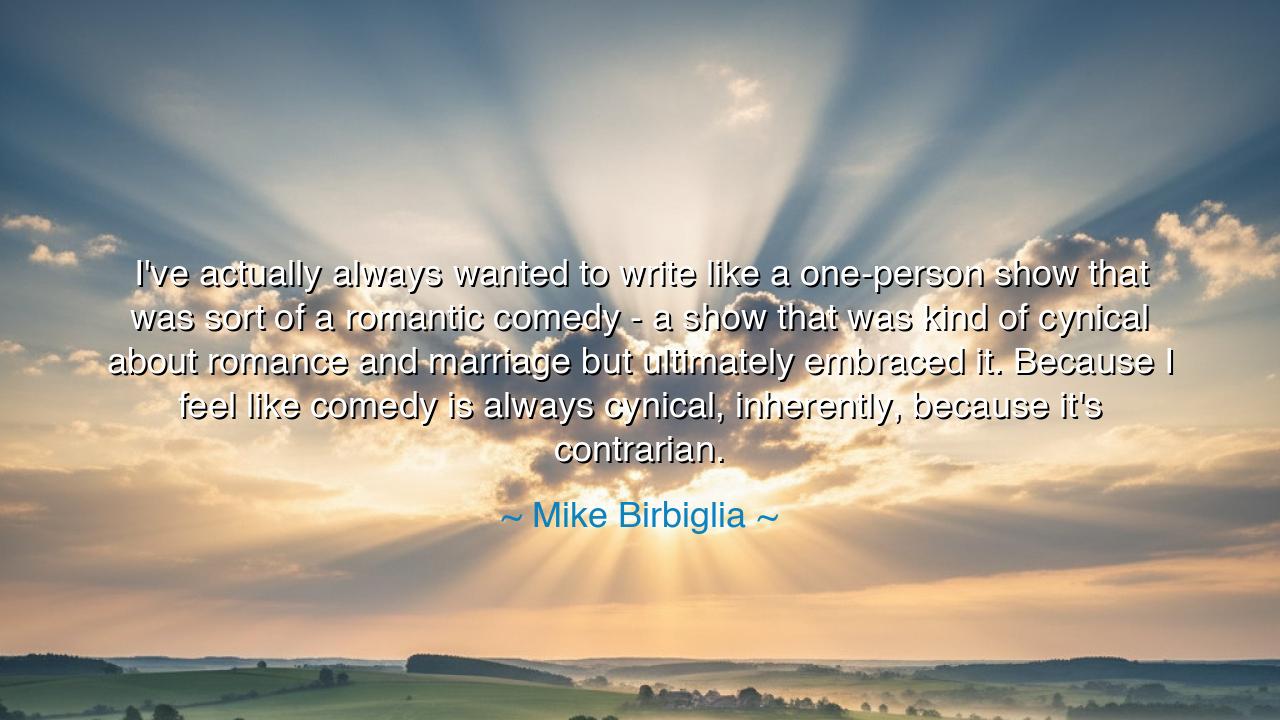
I've actually always wanted to write like a one-person show that
I've actually always wanted to write like a one-person show that was sort of a romantic comedy - a show that was kind of cynical about romance and marriage but ultimately embraced it. Because I feel like comedy is always cynical, inherently, because it's contrarian.






The words of Mike Birbiglia—“I've actually always wanted to write like a one-person show that was sort of a romantic comedy—a show that was kind of cynical about romance and marriage but ultimately embraced it. Because I feel like comedy is always cynical, inherently, because it's contrarian”—reveal a deep truth about both art and life. Here speaks a man who understands that laughter is often born from doubt, from contradiction, from the sharp eye that notices what others overlook. Yet beneath the veil of cynicism, he acknowledges a longing: to embrace romance and marriage, those timeless institutions that, though flawed, still hold sacred power.
The origin of this wisdom lies in the very nature of comedy. From the ancient Greeks, comedy was never mere frivolity. Aristophanes mocked politicians and exposed the hypocrisy of the powerful, revealing truths the crowd dared not speak aloud. Comedy has always been contrarian, a mirror that distorts not to conceal, but to illuminate. To laugh at love and marriage is not to destroy them, but to strip away illusions, so that what remains—the raw, enduring truth—can be cherished all the more. Birbiglia’s vision of a “cynical” comedy that ultimately embraces romance is thus not contradiction but harmony: it is the journey from skepticism to affirmation.
History gives us an example in Shakespeare, whose comedies often mocked love even as they celebrated it. In Much Ado About Nothing, Benedick and Beatrice scorn the very idea of romance, trading barbs and declaring their independence. Yet through wit and contrarian humor, their denial transforms into passion, and their cynicism collapses into love. Here we see the same arc Birbiglia describes: cynicism as the doorway to sincerity, contradiction as the path to acceptance. Comedy, by resisting, ultimately affirms.
Birbiglia’s words also remind us that romance and marriage are not perfect ideals, but human endeavors filled with flaws, missteps, and contradictions. To treat them with reverence alone risks creating brittle illusions. But to approach them with humor—with a willingness to laugh at our own mistakes, to admit the absurdities of partnership—is to give them strength. A love that cannot be laughed at is fragile; a love that can endure humor is resilient.
The lesson here is clear: embrace both cynicism and celebration. Let yourself question, tease, even mock the things you love—for in doing so, you test their strength. If they survive the laughter, they are truly worthy. And in the end, you will find yourself not destroyed by your cynicism, but renewed in your faith. To laugh at marriage is not to dishonor it; it is to prepare the soul to accept its imperfections and still call it sacred.
Practically, this means cultivating the ability to laugh at your own life. When love falters, when misunderstandings arise, when the daily grind of relationships wears thin, let humor be your ally. Allow yourself to be a contrarian, to see the absurdity in the very things you hold dear. For in that laughter lies healing, perspective, and ultimately, a deeper embrace.
Thus, Birbiglia’s vision of a one-person romantic comedy is more than entertainment—it is a parable for how we ought to live. We are each, in truth, the performers of our own one-person shows, narrating our contradictions, laughing at our own anxieties, and slowly, through humor, finding the courage to love.
So let this truth be handed down: comedy and cynicism are not enemies of love—they are its guardians. For to laugh at what is flawed is to make peace with it, and to embrace love after seeing its imperfections is to embrace it more fully. Through contrarian laughter, we arrive at the most honest affirmation of all—that love, though absurd, is still worth everything.






AAdministratorAdministrator
Welcome, honored guests. Please leave a comment, we will respond soon